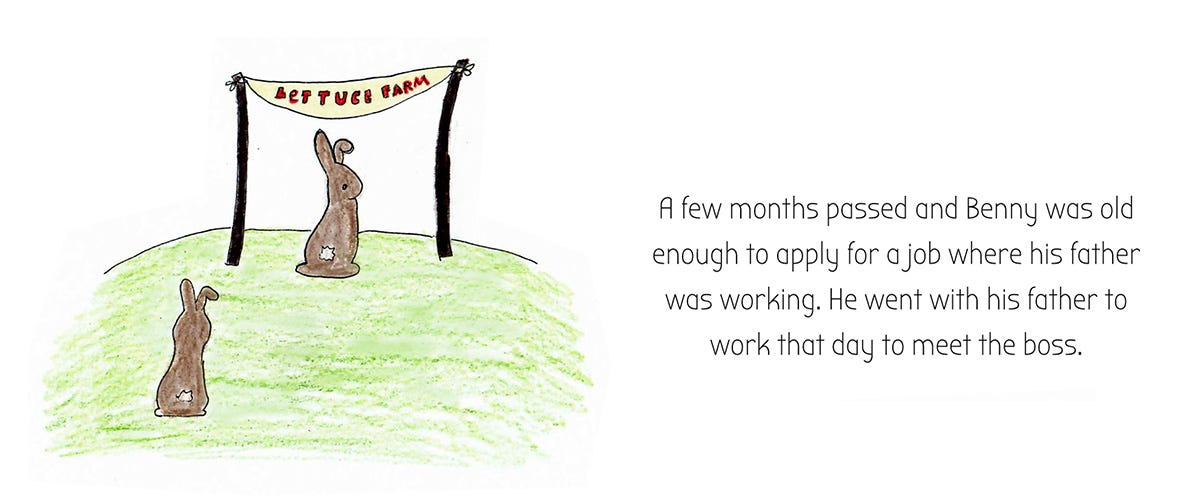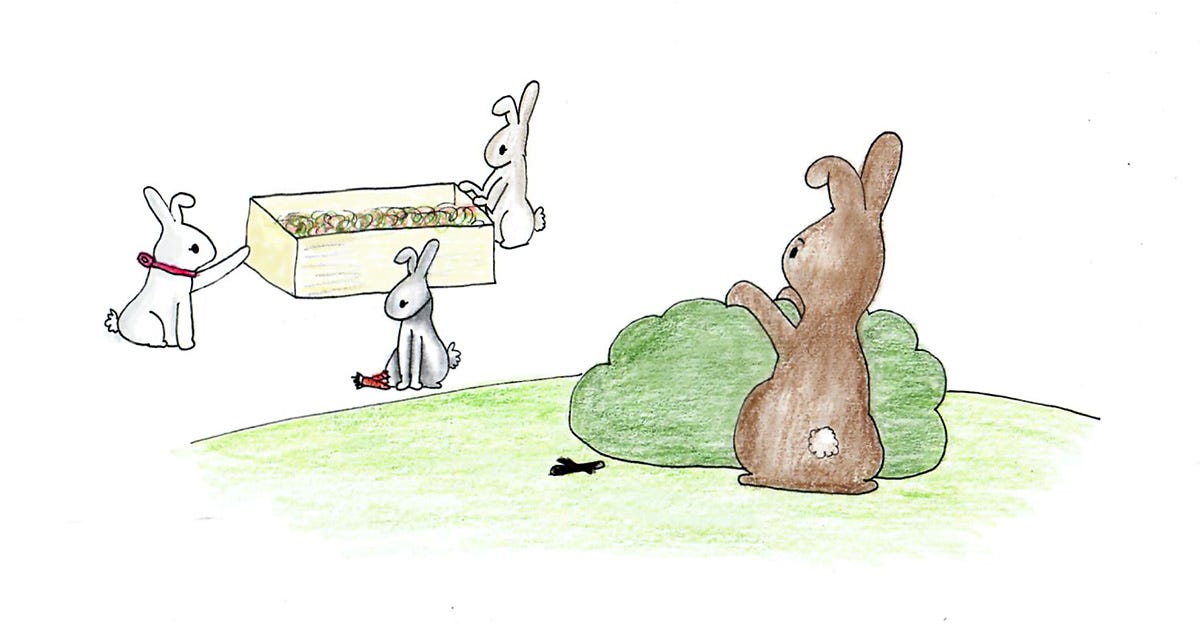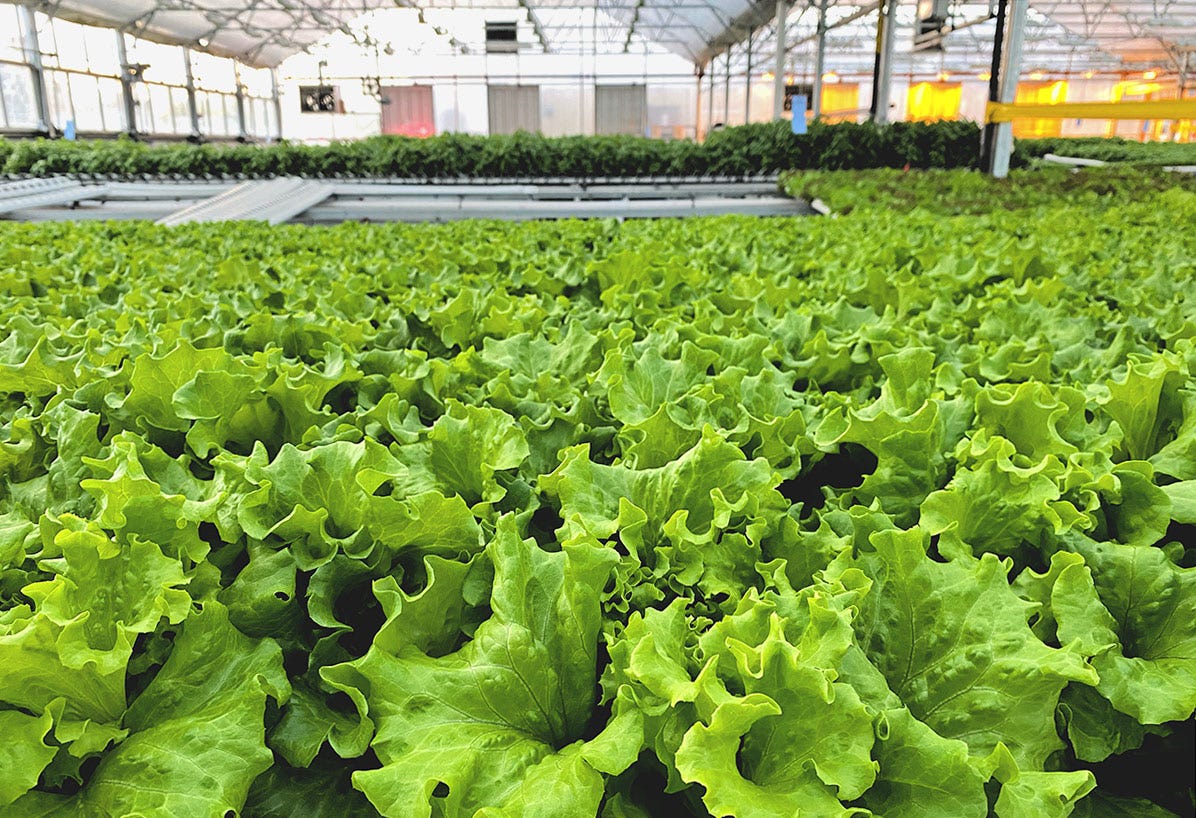Starting over, at the very bottom
Where do you go as a former business owner when you shut down a company?
An unlikely prophecy come true
A few weeks ago, I rediscovered in my files an illustrated children’s book about a family of bunnies that my 16 year old authored in 8th grade. It’s a project that their middle school English teacher assigns every year that culminates in a field trip to a nearby elementary where the 8th graders read their books to 1st graders. It’s very sweet, but Claudine’s class never got the chance to read their books because this was right when schools shut down during the pandemic.
In our household, we routinely joke how the entire storyline in her picture book came true just a few months later, like a prophecy. In the story, the mother bunny loses her job because “there weren’t as many crops for her to farm.” Later in the book, she gets rehired “when the crops become more plentiful again” after a group of worker bunnies get caught with more than their fair share of the day's harvest. The mother bunny’s storyline actually came true to life for us when Covid hit: I got furloughed with the rest of my coworkers and then got hired back about two months later.
But the real kicker is how the father bunny, who works on a lettuce farm, became an unexpected premonition for our future. We still laugh about it in disbelief every time it crosses our minds. When my kid wrote this book in the Fall of 2019, we were still entrenched in our bakery business; there was no possible scenario of any kind where we envisioned a lettuce farm in Mark’s future.
Until one day it came true.
When temporary becomes permanent
When NYC mandated all non-essential businesses to shut down in March of 2020, we closed our operations temporarily. We sat tight in that surreal suspended state of limbo with other business owners and wondered when this temporary closure would end. We went about our lives hunkering down at home, baking our own bread, and bingeing on Netflix along with everyone else.
Mark lasted all of two weeks before he got restless.
Like some chefs in New York who began taking on temp jobs in other areas of the food chain, Mark found temp work. A rooftop greenhouse within walking distance that mostly grows lettuce needed hourly workers when their staff stopped coming in due to long subway commutes and Covid risks. It was a minimum wage gig, but it was better than no income as we realized that this temporary closure might go on for longer than anyone imagined.

It wasn't without anxiety, however. Mark started working just a few weeks into the pandemic when even going outside felt really scary. These were the days when we wiped down our groceries, when the streets and subways were deserted, and when hand sanitizer and Clorox wipes were scarce and coveted commodities. I fought anxiety attacks the first few days he left the house and wondered if the minimum wage pay was worth the the risk to all of our health. I rummaged through our fabric scraps and sewed masks for him to wear to work because there were none yet available to buy. I laugh at how our first homemade masks were sewn from expensive, black Belgian linen because that was the only fabric that I could find around the house.
Mark stuck it out even as Covid became increasingly widespread and scary in NYC. At the end of a month, he got an official essential worker card when it became clear that the future of our business would remain uncertain.
A second career
Fast forward three years and this temp job has turned into a second career. Agtech is booming and he’s been growing slowly but steadily within the company as it opens new greenhouses around the country. For the very first time, Mark has mostly a desk job where he sits in front of a computer in an office that overlooks the greenhouse, staring at spreadsheets and such. He joins office outings and all hands meetings and for the first time, has coworkers he communicates with on Microsoft teams. I chuckle when he refers to things like KPIs. With my change in employment, we have essentially switched places as far as work culture goes.
I remember the days when he would visit me at my offices through the years, spinning himself around on my swivel chair like a kid because office life was so novel to him compared to the restaurants and kitchens where he’s spent most of his adult life. When Mark announced casually one day at dinner that he was this month’s employee spotlight, we clapped and congratulated him. But it was also amusing because the kids never saw their dad as the office type before and all they could picture was the employee of the month episode on “The Office.”
If I’m being really honest, the pandemic gave us an “easy” way out of our business, which was getting increasingly more difficult the last few years. Much in the same way I acknowledged at the very beginning of this Substack journey how my sudden job change forced me to reexamine what work means to me, the pandemic gave us the excuse to end something that we weren’t quite brave enough to walk away from.
It makes me wonder…I always thought I was an entrepreneurial person, but maybe I am just really good at triaging in crises moments? In my current state of in-betweeness, am I in triage mode once again?
Do we miss running our own business?
We often get asked if we miss the business. Sometimes I’ll turn to Mark and ask him the same question.
“Do you miss it?”
Most often the answer is “sometimes. But not really.”
The sometimes part is the actual baking and the faces and messages from customers, especially the ones who have stayed loyal to us for years despite rising shipping costs which only got higher and higher with each passing season. The not really comes from all the other stuff one has to deal with when running a food business including kitchen inspections, permits, lost packages, and the often harrowing drives zigzagging through stressful Manhattan traffic, dodging tickets while double parked to make deliveries to stores and cafes. Similarly, I don’t miss the everyday operating parts of running a physical product business, no. What I do miss is germinating an idea and seeing it come to life.
We used to joke all the time with our food friends when we were still in the thick of things, especially during the madness of the holiday season, about how there must be an easier way to make money. And of course there is. This is why I never quit my design career. But people in food don’t go into it for the money; they go into it for the love of their craft and the love of sharing their creations.
Many of our fellow Brooklyn small business food friends from that era have called it quits too. Twelve years seems to be the magic number.
“We’ve had a good run. Twelve years is a long time,” we reassure each other when another friend announces they are shutting down.
A few, however, have flourished and scaled and our college kid even got her first real job this summer with one of them. Seeing her work a booth at the same weekend food market where I used to chase after her as a toddler when we were working our own stand is a real trip. It never ceases to amaze me how circular life can be.
Where do you go from here?
It isn’t easy to envision your future when you shut down a company, especially one that you’ve run for over a decade. Where do you go from here? How do you transition from being your own boss to sliding into an existing corporate hierarchy, office culture, and politics?
For Mark, it was beyond humbling to start over at the very bottom of the totem pole and get paid a similar wage as a high school kid. We’re still trying to reconcile the difference in income between what our business brought in vs. this salaried job, but it isn’t shameful to do what you have to do to feed your family during crises moments. Nobody would argue against this in theory, but there’s still some stigma wrapped around taking a lower paying job that is deemed “beneath you.” If we accomplished anything as parents, I hope we taught our children the value and lesson that there is no shame or embarrassment in that.
I think back to Claudine’s story from time to time and how she interpreted pay inequity and wage gap through her story about bunnies. At age 12, this was probably the first time she understood that pay is not commensurate with the number of hours or how hard you work. I remember her exclaiming, “well that isn’t fair!”
Yes, kid. The world isn’t fair. It’s never going to be fair. But as soon as we changed our perspective on what this job means to our family and what it means to Mark, we started to look at things differently. We’re really grateful that he found another career after a 25 year run in the service industry. It’s still in the field of food manufacturing, but I think the greatest aspect to come out of this is feeling like he’s part of something on a much larger scale. It always comes down to community. After working in isolation for 12 years, it can’t be underestimated how positive this change has been. At the end of the day, most of us want to feel like we belong.







Oh this gives me hope that, at (gulp) 55 yo & after 2decades out of the workforce raising my family, & now recently divorced & needing to find work, I can maybe actually hopefully find a job that morphs into something meaningful, albeit one that I begin on a lower rung! Thank you!
I love all of the elements of this piece that point to the universe intervening your lives in order to give you what you needed, and especially Claudine's premonitory knowing on some level (can you tell I don't believe in coincidences? 😉) about this change.
So many magical moments here. Thank you for brightening my day! ✨